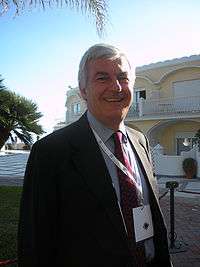Alessandro Profumo

Alessandro Profumo is an Italian manager who had significant influence in the consolidation of the Italian banking sector. As a representative of the share holder value based management approach he is considered to be ambitious. He worked as a consultant at McKinsey and, when CEO of Unicredit, he was involved in the merger with HypoVereinsbank, Bank Austria Creditanstalt and Capitalia with the UniCredit Group. He resigned as CEO of the Unicredit Group on 21 September 2010.[1]
Childhood and Youth
Alessandro Profumo was born in Genoa on 17 February 1957 as the youngest of five children. He grew up in Palermo; 1970 he moved to Milano with his parents where he went to the Liceo Manzoni and met his future wife Sabina Ratti, then his classmate.[2]
Studies, family and beginning of professional life
After finishing highschool, Profumo enrolled at Bocconi University. In 1977, he married Sabina, and his only son Marco was born the same year. Having to support a family, Profumo dropped out of college and started his professional career at Banco Lariano, with an initial salary of 377,000 Italian Lire.[2]
Professional development
In 1987, as a branch manager, Profumo decided to resume his studies. Writing his thesis during the nights, he obtained a degree in Business Economics.[2][3] By December of the same year he joined McKinsey, where he acted as a consultant to financial institutions.
In 1989 Profumo changed to the Bain, Cuneo & Associati consultancy.
In 1991 he left the consultant path and was appointed to General Manager of the banking and financial sector at RAS, Riunione Adriatica di Sicurtà. Following RAS's acquisition of shares of the recently privatized Credito Italiano in 1994, he became Deputy General Manager of Credito Italiano and was responsible for strategy and controlling. In 1995 he was appointed to Chief General Manager. On 29 April 1997 the UniCredit group was formed, of which Profumo became Chief Executive Officer. On 21 September 2010 he resigned from that position, following political disputes.
In early 2012 Profumo was appointed CEO of Italian bank Monte dei Paschi di Siena.
In June 2012, Alessandro Profumo and other 19 people were remanded to trial for a tax swindle. The charge is of creating an illegal tax evasion scheme worth 245 million euro. The scheme, according to the prosecution, was created through an arrangement between Unicredit, Barclays (the British bank) and two other minor companies. The trial is due to start in October 2012.[4]
Current activities
Since 1998 when UniCredit Group arose from “Credito Italiano” he has acted as its CEO. By December 2005 he was appointed to chairman of the supervisory board of HVB. Profumo is now President of the Monte dei Paschi bank (June 2012)
Alessandro Profumo’s activities by the end of 2006 included:
- Member of the supervisory board of Deutschen Börse in Frankfurt am Main
- Director of Mediobanca in Italy
Member of international organisations:
- European Financial Services Round Table, London
- Steering Committee of The Group of Thirty in New York
- Italian group of Trilateral Commission
- Investment Advisory Council for Turkey in Istanbul
- Management Committee of the Harvard Business School European Advisory Board in Boston
- Arnaldo Pomodoro Foundation and AIRC, the Italian association for cancer research.
Publications
Alessandro Profumo has written several articles and studies. In 2003 he published together with Giovanni Moro the book Plus Valori, addressing the “social responsibility of companies”.
Honours
2004 Alessandro Profumo was invested as Cavaliere al Merito del Lavoro of the Repubblica Italiana. Only a few economic personalities have received this award so far.
References
- ↑ "Italy: Milan:BMPS Executive Profiles – WSJ.com". quotes.wsj.com. Retrieved 26 June 2012.
- 1 2 3 "Il profumo dei soldi". L'Espresso (June 5, 2008).
- ↑ "Alessandro Profumo: Executive Profile & Biography – Businessweek". investing.businessweek.com. Retrieved 26 June 2012.
- ↑ "UniCredit, l'ex ad Alessandro Profumo rinviato a giudizio per frode fiscale".
External Sources
|